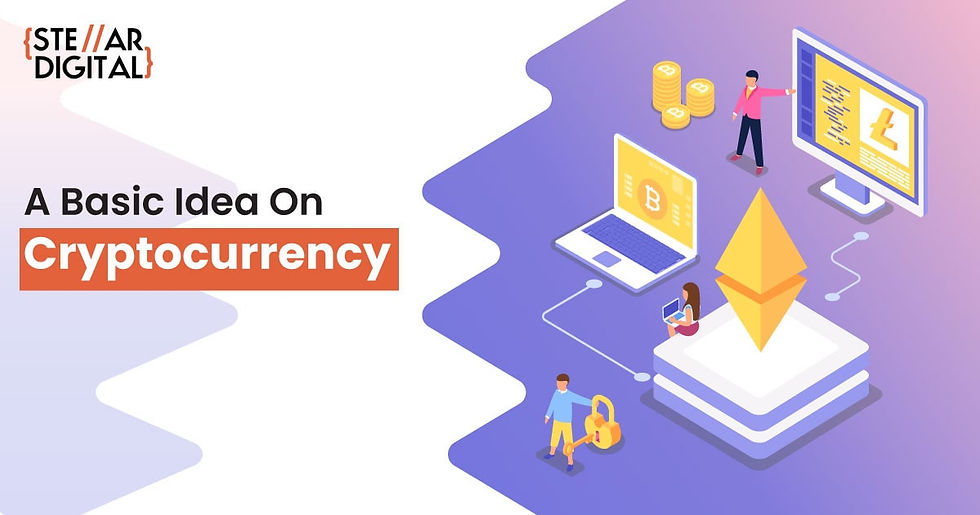WHAT EXACTLY IS CRYPTOCURRENCY?
- contactstellardigi
- Jun 1, 2022
- 2 min read

CRYPTOCURRENCY IN A NUTSHELL
Unlike traditional currencies, digital currencies do not have a physical form and exist only as virtual "coins." They're "mined" with specialized computer hardware, kept in "virtual wallets," and traded online without the need for a bank account. The technology that powers digital currency is known as blockchain. Whereas most transactions previously relied on a third party – such as banks, companies providing social media services, or real estate agents — blockchain technology now allows transactions to be performed directly between people.
WHAT ARE TRANSACTIONS IN CRYPTOCURRENCY?
Digital currencies, like bank accounts, are transacted using a wallet. On the other hand, we have power over our wallet. This wallet has two addresses: a public address and a private address. The money is sent to the public address. The sender will need the public address of the receiver's wallet in order to send digital currency from one wallet to another. They will enter that public address and send the cryptocurrency to that address.
To access the received coins in that wallet, you'll need a password or a private key. Blockchain technology safeguards a transaction when it is sent from one wallet to another.
As a result of the COVID-19 pandemic and the approaching inflation induced by the use of fiat currencies such as dollars or rupees, cryptocurrencies have gotten a lot of interest around the world. As a result, cryptocurrencies have gained reputation as a speculative asset and a store of wealth for people throughout the world who don't trust their money in bank accounts, government bonds, or the stock market. They utilize cryptocurrency as a new financial tool to earn interest or a high profit margin on their money.
For the same reason, they gained popularity in India. People are seeing their neighbors become wealthy after investing for a short period in this mysterious technology called as bitcoin. As a result, it has generated a lot of interest. Additionally, the exchanges are advertised, which has assisted them in their cryptocurrency investments.
THE FUTURE OF CRYPTOCURRENCY IN INDIA
People all across the world began investing and trading in cryptocurrencies as it gained in popularity. In India, the same trend can be witnessed, particularly in the years 2020-2021. The Reserve Bank of India (RBI) has adopted a slew of regulations. In India, cryptocurrencies were banned, but trading eventually resumed. The government no longer recognizes them as legal cash, and they are not controlled by the RBI. There are no restrictions prohibiting the use of cryptocurrency. Cryptocurrency is analogous to traditional assets such as gold, commodities, and so on in this regard.
According to the survey, 95.20% of total respondents believe that cryptocurrency would exist in India even after a decade. The remaining 4.80% of respondents believe that cryptocurrencies will not exist in the future owing to future government laws. However, given the large number of individuals who have invested in cryptocurrencies, there is a likelihood that crypto will continue to exist in the future, even if government laws are imposed.



Comments